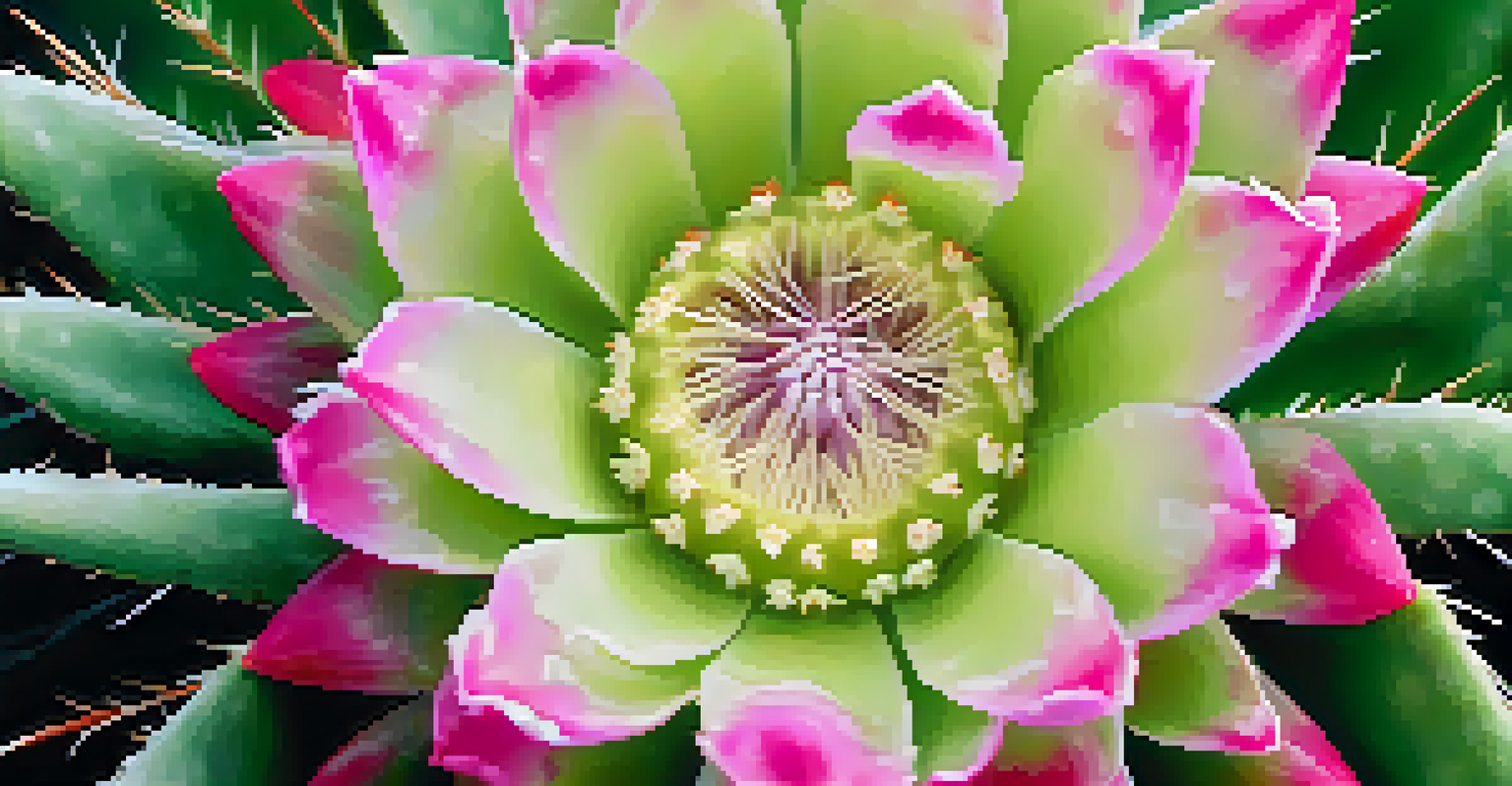Peyote's Role in Indigenous Culture and Environmental Ethics

Understanding Peyote: A Sacred Plant for Indigenous Peoples
Peyote, a small cactus native to North America, holds deep spiritual significance for many Indigenous communities, particularly those in Mexico and the southwestern United States. Known for its psychoactive properties due to the compound mescaline, this plant has been used for centuries in religious ceremonies and healing rituals. For these cultures, Peyote is not just a plant; it embodies a connection to their ancestors and the natural world.
The sacredness of Peyote lies not only in its psychoactive properties but in its role as a bridge between the spirit world and the earth, fostering a deep connection to nature and our ancestors.
The use of Peyote is woven into the fabric of Indigenous spirituality, often serving as a medium for communication with the divine. During ceremonies, participants consume the cactus to induce visions and gain insights, which they believe help guide their lives. This practice reinforces community bonds and preserves cultural heritage, making Peyote an essential element of Indigenous identity.
However, the significance of Peyote extends beyond its spiritual uses. It plays a crucial role in advocating for environmental stewardship, as it encourages respect and understanding of nature's cycles. Through their relationship with Peyote, Indigenous peoples highlight the importance of protecting natural resources and maintaining ecological balance.
Cultural Practices Surrounding Peyote Use
The ceremonies involving Peyote are rich with symbolism, tradition, and community participation. For many Indigenous groups, these rituals are not only about consuming the cactus but also about storytelling, music, and dance. Each element serves to reinforce cultural values and connect individuals to their heritage, promoting a sense of belonging and continuity.

In these gatherings, participants often share personal experiences and insights gained during Peyote ceremonies, creating a collective narrative that strengthens community ties. This storytelling aspect is crucial, as it allows wisdom and teachings to be passed down through generations. It ensures that the cultural significance of Peyote remains alive and relevant in contemporary society.
Peyote's Cultural Significance
Peyote serves as a spiritual bridge for Indigenous communities, fostering connections to their ancestors and the natural world.
Moreover, the cultural practices surrounding Peyote use emphasize respect for the land. Participants are taught to honor the environment and understand the interconnectedness of all living beings. This fosters an ethic of care that extends beyond the ceremony itself, encouraging sustainable practices that protect both the plant and its habitat.
The Environmental Impact of Peyote Harvesting
While Peyote is revered for its cultural significance, its harvesting raises important environmental concerns. Overharvesting, driven by increased demand and commercialization, threatens the natural populations of this sacred cactus. As a result, some Indigenous communities are advocating for sustainable harvesting practices that honor the plant's role in their culture while protecting it from extinction.
In recognizing the cultural significance of plants like Peyote, we uncover the profound relationship between Indigenous peoples and their environment, which has existed for centuries.
Sustainable practices include limiting the amount of Peyote harvested and ensuring that it is gathered in a way that allows the cactus to regenerate. These methods reflect a broader understanding of environmental ethics rooted in Indigenous knowledge systems. By prioritizing sustainability, these communities not only preserve their cultural heritage but also contribute to global conservation efforts.
Additionally, the plight of Peyote serves as a reminder of the delicate balance between cultural practices and environmental health. It challenges us to reconsider how we interact with nature and the ethical implications of our choices. Through responsible stewardship, Indigenous peoples are leading the way in promoting a harmonious relationship with the environment.
Peyote and Indigenous Rights Movements
The significance of Peyote extends beyond personal and communal spirituality; it also plays a vital role in Indigenous rights movements. Many tribes view the protection of Peyote as integral to their cultural survival and autonomy. This perspective has led to legal battles and advocacy for the recognition of their right to use Peyote in religious ceremonies without interference.
In the United States, the American Indian Religious Freedom Act of 1978 helped pave the way for legal protections for the use of Peyote among Indigenous peoples. However, ongoing challenges remain as external pressures continue to threaten their rights and the natural habitats where Peyote grows. These struggles underscore the importance of recognizing and respecting Indigenous cultures and their relationship with the land.
Environmental Challenges Ahead
Overharvesting and climate change threaten Peyote's survival, impacting both the plant and the cultural practices tied to it.
By fighting for their rights to use Peyote, Indigenous communities are also advocating for broader environmental justice. Their efforts draw attention to the need for ethical considerations in policy-making that affect both cultural practices and ecological health. This intersection of rights and environmental ethics illustrates the complexity of the issues Indigenous peoples face today.
The Role of Peyote in Contemporary Society
In recent years, there has been a growing interest in Peyote beyond Indigenous communities, sparking discussions around its potential therapeutic benefits. Research into the psychoactive properties of Peyote, particularly mescaline, suggests it may have applications in treating various mental health conditions. However, this newfound attention raises ethical questions about appropriation and the commodification of Indigenous cultural practices.
As more people seek to explore Peyote for its mind-altering effects, it is crucial to approach this interest with respect for the traditions that have honored the cactus for centuries. Engaging with Indigenous voices and perspectives is essential to ensure that the use of Peyote is done ethically and in a way that honors its cultural significance. This dialogue can foster a deeper understanding of the plant and the values it represents.
Ultimately, the role of Peyote in contemporary society should be approached with care. Balancing the interests of Indigenous peoples with the growing fascination in the wider world requires thoughtful consideration and respect for cultural heritage. This balance is vital for ensuring that Peyote remains a living symbol of connection to the spiritual and natural worlds.
Challenges Facing Peyote's Future
The future of Peyote is fraught with challenges, mainly stemming from environmental changes and cultural appropriation. Climate change poses a significant threat to the habitats where Peyote grows, potentially disrupting the delicate ecosystems that sustain it. As temperatures rise and weather patterns shift, the survival of this sacred cactus becomes increasingly precarious, posing risks not only to the plant but to the cultural practices that depend on it.
Additionally, the increased commercialization of Peyote has led to concerns about its availability and the potential exploitation of Indigenous cultures. When non-Indigenous individuals or companies commodify Peyote, they often overlook the cultural significance and ethical considerations surrounding its use. This trend can undermine the very communities that have preserved and honored the plant for generations.
Advocacy for Indigenous Rights
The fight for Peyote rights is central to Indigenous movements, emphasizing the need for legal protections and respect for cultural practices.
Addressing these challenges requires a collective effort to promote awareness and understanding of Peyote's cultural and environmental importance. Advocacy for legal protections, sustainable practices, and respect for Indigenous knowledge is essential for safeguarding the future of this sacred plant and the traditions it supports.
The Path Forward: Respect and Stewardship
As we reflect on Peyote's role in Indigenous culture and environmental ethics, it becomes clear that respect and stewardship are paramount. Recognizing the deep cultural connections that Indigenous peoples have with Peyote fosters a greater appreciation for the plant's significance and the wisdom inherent in traditional practices. By prioritizing Indigenous perspectives, we can better understand the ethical implications of our interactions with nature.
Promoting sustainable harvesting and protecting Peyote habitats are vital steps toward ensuring the plant's future. This approach not only honors the cultural traditions surrounding Peyote but also aligns with broader environmental conservation efforts. By working together, we can create a more equitable and sustainable future for both Indigenous communities and the ecosystems they inhabit.

Ultimately, the journey forward involves collaboration, respect, and understanding. It challenges us to rethink our relationship with nature and recognize the importance of preserving cultural legacies. By embracing these values, we can ensure that Peyote continues to thrive as a symbol of spirituality, community, and environmental stewardship.